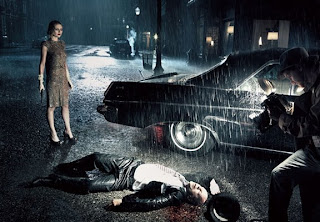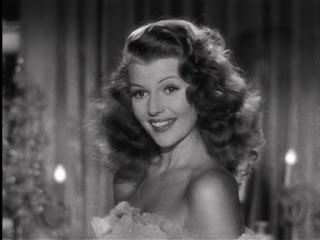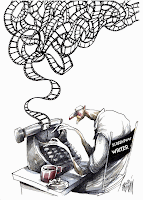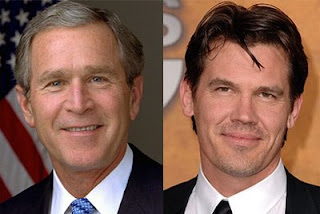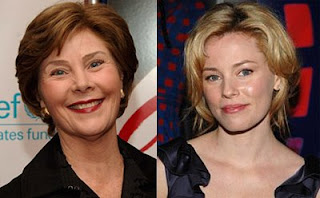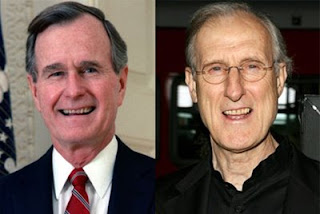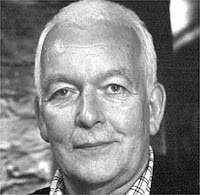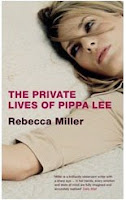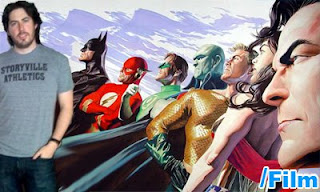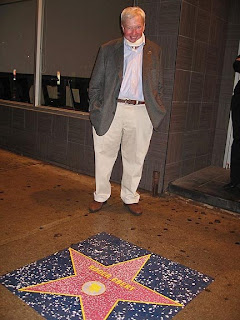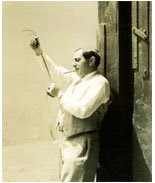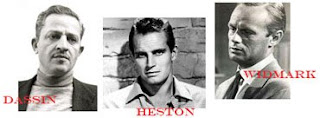Screenwriting News & Links! 4/28/08
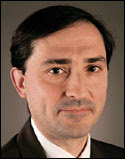 Check out Evan’s D-bomb-dropping diatribe about WGA’s latest debacle of an e-mail in which they release (and openly condemn) the names of the few writers who went financial core during the strike. Verrone's just an angry little troll. Look at him! He's a troll! Here’s August’s reaction: “Clearly, de-mythologizing was not the goal here. If anything, it’s a call to unsheath swords once again, this time to fight enemies among us. As the archives will show, I supported the strike strongly, both in miles walked and moments blogged. But guys? It’s over. And trying to reignite the flames of guild fury over 28 names is ridiculous. It makes the guild look as crazy as the AMPTP tried to portray us.” (Uhh, maybe our leaders ARE crazy?) Here’s Lee Goldberg: “…tarring-and-feathering the writers who went financial core, and suggesting that we not hire them, is wrong. The boards of the WGA West and East should be ashamed of endorsing this wrong-headed action and supporting this offensive letter.” And here’s Craig Mazin: “What an embarrassing and sad day for our union. This letter isn’t something that will destroy us. It’s just a stain. An ugly, unnecessary stain.” Damn troll.
Check out Evan’s D-bomb-dropping diatribe about WGA’s latest debacle of an e-mail in which they release (and openly condemn) the names of the few writers who went financial core during the strike. Verrone's just an angry little troll. Look at him! He's a troll! Here’s August’s reaction: “Clearly, de-mythologizing was not the goal here. If anything, it’s a call to unsheath swords once again, this time to fight enemies among us. As the archives will show, I supported the strike strongly, both in miles walked and moments blogged. But guys? It’s over. And trying to reignite the flames of guild fury over 28 names is ridiculous. It makes the guild look as crazy as the AMPTP tried to portray us.” (Uhh, maybe our leaders ARE crazy?) Here’s Lee Goldberg: “…tarring-and-feathering the writers who went financial core, and suggesting that we not hire them, is wrong. The boards of the WGA West and East should be ashamed of endorsing this wrong-headed action and supporting this offensive letter.” And here’s Craig Mazin: “What an embarrassing and sad day for our union. This letter isn’t something that will destroy us. It’s just a stain. An ugly, unnecessary stain.” Damn troll.
Beyond that, all is quite on the screenwriting front. TOO quite. It’s downright SPOOKY. We need to liven things up! Shall we have another blog-a-thon? Any suggestions? Maybe a scene-a-thon?
-MM
--------------------------------------
Unk on the protagonist’s call to action dilemma
“You may or may not have heard about this… Most of us have heard about the Protagonist’s “call to action” which is followed by “refusal of the call.” And I personally believe in the Protagonist’s call to action — refusal of the call but what about right before the call to action? Remember the inciting incident? Remember how it totally kicks the Protagonist off that balance beam we call his or her ordinary world? Well right after we make him or her lose their balance and take that fall, they’re stunned. They weren’t expecting this to happen to them. Their ordinary world is now disrupted to the point that they’ve got to stand back and take a breath… They don’t know what the fuck to do… Time to regroup.”
Danny Stack’s Tips on Going to Cannes
“1. Be Clear What You're Going For
Treat it completely like a work trip. Ask yourself why you want to be there and what you want to get out of the Festival, and then stick exclusively to that.”
Kristen Olson says “Horse Twaddle”
“Screenwriting is a performative act; that is to say that it is a matter of performance, and not of intent. There are a lot of screenwriters that think of themselves as artists. What becomes important to them as a product of this belief is focusing on artistic sensibilities and inspiration. Horse twaddle. Whether you’re a screenwriter cannot be decided by whether you write a screenplay, sell a screenplay, or loftily pursue the elevation of the art. Being a screenwriter is about one thing, and that’s what you’ve got to prioritize over absolutely everything else: communicating with the audience.” 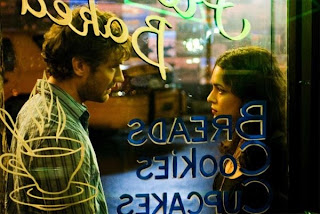
Matt Zoller Seitz on My Blueberry Nights
“In place of a Syd Field-approved three act story, My Blueberry Nights offers a series of moments (some pivotal, others fleeting) in the lives of various, tangentially unrelated characters. The moments are threaded together via the experiences of a New York coffee shop waitress named Elizabeth (Norah Jones), who tries to get over a breakup by living and working in other cities, witnessing and/or participating in other characters' dramas. But Elizabeth's experiences less a dramatic through-line than an emotional echo chamber: a means for Wong to simultaneously explore one character's self-reckoning and a second character's reaction to it. (Every other character seems to have lived more, and suffered more, than Elisabeth has.)”
Bill on Juicy Scenes & Pacing
“Suspense is the anticipation of an action - so we need to know what the action is, then use one of many techniques to stretch out the anticipation of that event... without allowing the audience to forget the event. Horror also uses dread (covered on the horror CD) which is the anticipation of an unspecific event. We know that there is a killer outside, but don’t know which door or window they will attack through... and now you stretch out the anticipation without allowing the audience to forget the killer or monster or ghost or whatever.”
MaryAn on Writing the Wrong Story
“I frequently talk to writers who admit to submitting: (1) tribute stories (2) partially fleshed out ideas (3) genres they're uncomfortable writing. All three are mistakes. They think it's an even trade off if the idea is commercial or high concept. I disagree. A poorly executed good idea is not better than a well executed mediocre one. Okay, yes, commercial and high concept ideas are more likely to be produced but poor writing will get tossed in the can. Oh, and here's a tip. Producers don't care who your story memorializes if it's not a good one.”
"Look at him standing there," writes David Carr in the New York Times, "a great big movie star in a great big movie, the Iron Man with nary a trace of human frailty. A scant five years ago the only time you saw Robert Downey Jr getting big play in your newspaper came when he was on a perp walk." Slide show: "The Faces of Robert Downey Jr."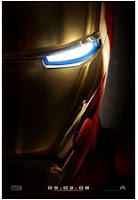 "With its dusty Humvees, violent Afghan battlefields, and worries about the munitions business, the upcoming Iron Man is a film set firmly in 2008," writes Andrew Stuttaford in the New York Sun. "That'll do, I suppose, but what was wrong with 1963? If there's any tale that deserves the chance to return to the sheen, swank, and soul of its Rat Pack, space-age, pay-any-price-bear-any-burden origins, it's Iron Man's." (Yeah, it’s just like a critic to bitch about a film not being in, good God, 1963. Ugh… Try to catch up with the rest of the world, will ya, Andrew? –MM) "Finally, someone's found a sure-fire way to make money with a modern Middle East war movie," writes Variety's Todd McCarthy. "Just send a Marvel superhero into the fray to kick some insurgent butt. The powerhouse comicbook-inspired actioner Iron Man isn't principally about this fantasy, but it won't hurt at least American audiences' enjoyment of this expansively entertaining special effects extravaganza." Also, Anne Thompson: "[I]f Iron Man delivers on the prognostications, the first summer blockbuster of 2008 will see several participants emerge with new cachet." (Thanks to GreenCine.)
"With its dusty Humvees, violent Afghan battlefields, and worries about the munitions business, the upcoming Iron Man is a film set firmly in 2008," writes Andrew Stuttaford in the New York Sun. "That'll do, I suppose, but what was wrong with 1963? If there's any tale that deserves the chance to return to the sheen, swank, and soul of its Rat Pack, space-age, pay-any-price-bear-any-burden origins, it's Iron Man's." (Yeah, it’s just like a critic to bitch about a film not being in, good God, 1963. Ugh… Try to catch up with the rest of the world, will ya, Andrew? –MM) "Finally, someone's found a sure-fire way to make money with a modern Middle East war movie," writes Variety's Todd McCarthy. "Just send a Marvel superhero into the fray to kick some insurgent butt. The powerhouse comicbook-inspired actioner Iron Man isn't principally about this fantasy, but it won't hurt at least American audiences' enjoyment of this expansively entertaining special effects extravaganza." Also, Anne Thompson: "[I]f Iron Man delivers on the prognostications, the first summer blockbuster of 2008 will see several participants emerge with new cachet." (Thanks to GreenCine.)
Diablo Cody Recommends Self-Publishing to Aspiring Writers
“The Oscar winning screenwriter of Juno, Diablo Cody, began her writing career on the blogosphere and by self-publishing her book, Candy Girl: A Year in the Life of an Unlikely Stripper. I located an interview she did on NPR. An aspiring screenwriter called in and asked what advice she had for young writers, and in a refreshing change of pace from the typical ‘Go out and take your licks,’ type of answer, she actually recommended that young writers self-publish. You can listen to the entire interview here: Diablo Cody Pens Sweet, Sassy 'Juno'”
Michel Shane and Anthony Romano working on Lifeboat 13
“Michel Shane and Anthony Romano (I Robot, Catch Me if You Can) are at work developing Lifeboat 13. The film is based on the WWII story of the four chaplains who gave their lives following the 1943 sinking of the Dorchester. Variety reports the two have picked up the rights to the screenplay by Michael Justiz and Steven Sikes – which was based on a story by Justiz, Sikes and David Fox. The screenplay was inspired by the tale of a rabbi, a Catholic priest and two Protestant ministers, as well as an African-American Coast Guardsman, who gave their life jackets to others as the Dorchester sunk off the Greenland coast in 36-degree waters. The shipped was attacked and torpedoed by a U-boat.”
The Nazi Plot That’s Haunting Tom Cruise and United Artists
“When United Artists said this month that it would again delay the release of Valkyrie, in which Tom Cruise plays a German officer who tries to kill Hitler, the Web went into obituary mode. One Hollywood Internet site, thehotblog.com, flatly declared, 'Valkyrie is dead.' Another, defamer.com, said that the revival of United Artists had effectively died with it. Meanwhile, Roger Friedman, a widely read Web reporter with a column on foxnews.com, had some career advice for Mr. Cruise: ‘He needs another ‘Jerry Maguire’-like romantic comedy, and he needs it now.’”
Film Camp hosts new screenwriting program
"This year’s Summer Camp hosted by the award-winning Cape May Film Academy, will start a new program this year focusing on screenwriting. The week-long program, running from June 23-27, will result in participants learning more about plot, character, dialogue, and setting—all from Cape May’s favorite Hollywood screenwriter. Last year, nearly two-dozen students participated in the program, which led to the creation of films that were screened at the Cape May Film Festival last November."
Jeff Goldsmith’s podcast interview with David Chase of the Sopranos
This Spec's a Keeper
MGM won a bidding war and shelled out $2 million for Jay Scherick and David Ronn's (Norbit) comedy spec The Zookeeper, and has hired Walt Becker (Wild Hogs) to direct.
Comic Art Sells a Thousand Scripts
"Crunch these numbers: 22 announced films from graphic novels or comics in six weeks. Want some screenwriting advice? Add drawings to your script. And then put your dialogue in bubbles. If recent studio acquisitions are any evidence, then the fastest way to get a movie deal these days may just be to turn your next Big Idea into a graphic novel. In a faddish frenzy, no fewer than 22 film projects born of graphic novels or comics have been announced in the last six weeks. 'It's accelerating because right now it's fashion,' says Frank Miller, who created the graphic novels behind Sin City and 300, and whose early-'80s series Ronin, about a reincarnated samurai battling evil in a futuristic New York, is being adapted by Joby Harold (Awake) for Warner Bros. 'I think we can expect it to calm down. Comic books have always been this vast mountain range that gets strip-mined and left behind.'"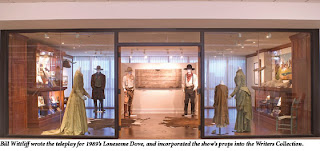
The Southwestern Writer’s Collection
“The collection’s archive houses the papers and artifacts of regional writers, filmmakers, musicians, and photographers. Robert Duvall’s Lonesome Dove costumes and Willie Nelson song lyrics jotted on restaurant napkins are among the treasures in its temperature-controlled vault, as are the collection’s newest gems: Cormac McCarthy’s manuscripts and working papers. At the entrance stands political cartoonist Pat Oliphant’s larger-than-life, full-body bronze sculpture of Glen Rose writer John Graves...”
Robert Towne & that Shampoo Script
As the critic and teacher Elaine Lennon points out in a 2005 piece for Senses of Cinema, the true complexity of Shampoo's script stems from the same element the film has been derided for — its superficially silly comic spirit. Lennon suggests that the many influences detectable in Shampoo include ancient Greek tragedy, the restoration comedies of 17th- and early 18th-century England, and the plays of Molière. All of the above construct poignant social critiques while providing comic relief. Indeed, Shampoo uses the sexuality that permeates its turbulent and intricately woven Beverly Hills microcosm to farcically comment on the United States of the late 1960s. George (Beatty), the restless hairdresser with a soft spot for his customers, his girlfriend Jill (Goldie Hawn), his ex-girlfriend and lover Jackie (Julie Christie), his other lover Felicia (Lee Grant), and Felicia's husband and Jackie's sugar daddy Lester (Jack Warden) not only share the same lovers, they share the same anxiety — a feeling produced by an ever-changing, unstable society. To put it differently, their sexual misbehavior is a manifestation of the fluidity and uncertainty of their lives.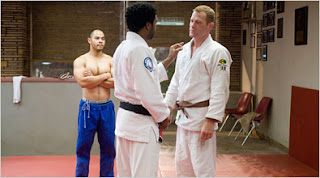
David Mamet talks Redbelt
“Fight films are sad. There is nobility in effort, in discipline and, if not in suffering, in trying to live through suffering and endeavor to find its meaning. Redbelt, generically, is a fight film. The martial art film is about opposing strength to strength: two humans compete, and we are allowed to root for the underdog and enjoy his final victory. But the fight film is a celebration of submission, which is to say, of loss. As such, it finds itself on the outskirts of my beloved genre of film noir. The punchline of drama is ‘Isn’t life like that. ...’ But its elder brother, tragedy, is the struggle of good against evil, of man against the gods. In tragedy, good, and the gods, are proclaimed winners; in film noir, which is tragedy manqué, the gods still win, but good’s triumph gets an asterisk.”
Video - 1 Hour of Screenwriting - with hungry cats & crying baby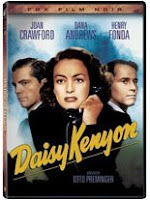 For James Wolcott, Daisy Kenyon "is a fascinating chamber drama shot in deep-volumed noirish black and white (every room looks like a cove), with dialogue that tears through sentimentality with sharp little teeth and a clutch of tough, wary, ultra-observant performances by Joan Crawford, Dana Andrews (even more prickly with postwar dissatisfaction than in The Best Years of Our Lives), and a deceptively easy-going Henry Fonda.... If you haven't seen Daisy Kenyon (and you probably haven't, being so buried under the backlog of all your Wire and Battlestar Galactica DVDs), you really must give it a dark whirl." (Thanks to GreenCine.)
For James Wolcott, Daisy Kenyon "is a fascinating chamber drama shot in deep-volumed noirish black and white (every room looks like a cove), with dialogue that tears through sentimentality with sharp little teeth and a clutch of tough, wary, ultra-observant performances by Joan Crawford, Dana Andrews (even more prickly with postwar dissatisfaction than in The Best Years of Our Lives), and a deceptively easy-going Henry Fonda.... If you haven't seen Daisy Kenyon (and you probably haven't, being so buried under the backlog of all your Wire and Battlestar Galactica DVDs), you really must give it a dark whirl." (Thanks to GreenCine.)
Budd Schulberg received a lifetime achievement award from WGA.
The Blob Screenwriter Passed Away.
Editor recalls a lost Jack Nicholson script
“JACK NICHOLSON once wrote a screenplay about a struggling Hollywood actor trying to raise the cash for his girlfriend's abortion - but the project was cast aside for its risque plot. And now no one can find the script - because the movie executive who passed on the raw screenplay in the early 1960s is now dead, and he never made a copy of Nicholson's. Universal ' former story editor Michael Ludmer has brought the lost script to the attention of the Los Angeles Times newspaper, insisting Nicholson's screenplay, titled To Hold A Mirror, will 'make a fine movie even today'. Ludmer says, 'It was a story editor's dream come true - riveting, thoughtful and, above all, entertaining.' Nicholson, then a little-known B-movie star, had planned on directing and starring in the film, but Universal boss Julian Ludwig refused to greenlight the project because he feared it would be an X-rated movie. Contacted by the Times, Nicholson's longtime agent, Sandy Breisler, had no recollection of the script.”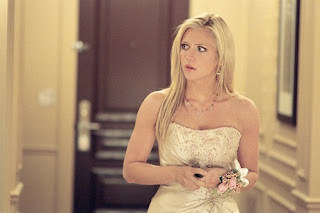
Attack of the horror movie remakes
“Smell that? It's the decay of original ideas… ‘The executive mind-set of most studios is that they feel much more comfortable with pre-defined material,’ says Joe Cardone, who penned Prom Night as well as scripts for upcoming remakes of The Stepfather and See No Evil. ‘Our approach is that we try to find some really interesting hook that I can play with that's relatively fresh within the confines of the cliché.’ These remakes have preexisting brand recognition, relatively low budgets and a reliable youthful audience for the studio to bank on. And even if the work is less than gratifying, the writer-filmmaker benefits from the greater likelihood that these lower-risk scripts will be greenlighted as well as from the income provided by an ever-regenerating genre. (And look at The Ruins, an original premise that opened to disappointing box office.)”
'Corner Gas' snags screenwriting award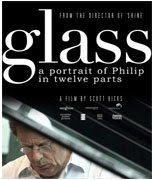 "Shot over 18 months, [Glass: A Portrait of Philip in Twelve Parts] follows the influential modern composer Philip Glass through a little more than a year in his life with a casual honesty and deftly shifting distance that flatter the viewer by not kowtowing to its subject." Bruce Bennett talks with director Scott Hicks for the New York Sun. "Glass's status as one of America's most venerated and mocked highbrows matches gracefully with his peripatetic cultural and spiritual life; he may not define himself exclusively as a Buddhist, but his frequent self-targeted laughter and robust playfulness at physical-meditation sessions are so clearly engrained, not affected, that he often seems like a jolly, music-consumed monk," writes Bill Weber in Slant. (Thanks to GreenCine.)
"Shot over 18 months, [Glass: A Portrait of Philip in Twelve Parts] follows the influential modern composer Philip Glass through a little more than a year in his life with a casual honesty and deftly shifting distance that flatter the viewer by not kowtowing to its subject." Bruce Bennett talks with director Scott Hicks for the New York Sun. "Glass's status as one of America's most venerated and mocked highbrows matches gracefully with his peripatetic cultural and spiritual life; he may not define himself exclusively as a Buddhist, but his frequent self-targeted laughter and robust playfulness at physical-meditation sessions are so clearly engrained, not affected, that he often seems like a jolly, music-consumed monk," writes Bill Weber in Slant. (Thanks to GreenCine.)
'Children of Men' Screenwriter Takes On 'Timecrimes' Remake
“The biggest pitfall here, as I see it, is that the original film is so simple, almost personal. That's part of its charm. The time travel is a matter of hours, not eons, and the main crisis implicates two guys, not the entire universe (though there are hints of possible larger implications). I hope that Sexton doesn't try to translate the epic scope of Children of Men -- more epic, as I understand it, than the P.D. James novel on which it was based -- to this very different project. Sexton is also attached to the beleaguered Logan's Run remake, but who knows what's going on with that one.”
Ian Fleming's war spying helped inspire James Bond
“He may not have cheated death, seduced women at will and killed countless baddies, but James Bond creator Ian Fleming's experience of the shadowy world of wartime espionage helped inspire his bestselling novels. ‘For Your Eyes Only’ is the first major exhibition devoted to the British author and coincides with the centenary of his birth. It opens at London's Imperial War Museum on Thursday and runs until March 1, 2009.”
Barry Schwartz, 28, sells 'Parents Weekend'
“Screenwriter Barry Schwartz has sold his original script Parents Weekend to Arnold Kopelson, Oscar-winning producer of Platoon, The Fugitive and Se7en, for low-six figures against mid-six figures. Schwartz describes his R-rated comedy as ‘a life-event milestone movie, like Meet the Parents or Knocked Up,’ that takes place during the 48 hours when ‘the kids and the parents get to see each other as independent people for the first time ever.’”
Moriarty from Aint It Cool News is writing a script with Scott Swan called Bat Out of Hell, which is said to be a new spin on a classic monster. The story takes place on a red eye flight from LA to NYC.
Spielberg Adapting Ghost in the Shell into Live-Action 3D
“After 19 years since its debut in 1989, DreamWorks has finally secured the rights to adapt the Japanese manga and anime series Ghost in the Shell into a 3D live-action feature film. Both Universal and Sony were also chasing the rights, but Steven Spielberg himself took a personal interest in it and made sure it ended up in the hands of his company - DreamWorks. Spielberg says that Ghost in the Shell is one of his favorite stories and is ‘a genre that has arrived and we enthusiastically welcome it to DreamWorks.’ This plays off of the announcement from February that Akira, one of the other heralded Japanese anime properties, is being adapted by Warner Brothers as well. Street Kings screenwriter Jamie Moss has been hired to write the adaptation…”
Great White Snark counts down the Five Most Ridiculous Legal Disputes Involving LucasFilm. George Lucas sued Digg.com? Who knew?
Buzz Sugar wonders if the Farrelly Brothers should make more movies? The Answer is no.
The Movie Blog has a theory that Obi-Wan Kenobi was a Clone.
Rotten Tomatoes take a look at the 20 Greatest Fight Scenes of all time.
Not much going on in the world of screenwriting, so here are a few more links courtesy of CS Daily:
Winter's Wonderland
Columbia has paid low-six for first-time writer Paul Fruchbom's spec Winter's Discontent, a comedy about an old man who moves into a nursing home after his wife's passing with intentions to enjoy the bachelor life.
Furiously Out of Ideas
Fox 2000 is set to remake the 1978 Brian DePalma horror film The Fury, with first-time writers Brian McGreevy and Lee Shipman to pen the script.
Sniper Rifles Not Allowed
Phoenix Pictures has bought Javier Rodriguez's spec The Heretic, a Renaissance-era thriller about a priest-turned-hitman hired to assassinate Martin Luther.
Stewie Griffin: The Unpaid Story
Creator Seth MacFarlane and 15 of his Family Guy writers have sued 20th Century Fox for breach of contract and deceit stemming from extra work they all did on the DVD release Stewie Griffin: The Untold Story.
Kingdom of the Numb Skulls?
The L.A. Times looks into the deal made between Paramount and Indiana Jones kingpins Steven Spielberg, George Lucas, and Harrison Ford. It's low risk for the studio and could be a predecessor of how blockbuster budgets are handled in the future.
Speaking Softly
Ethan Coen (the one who didn't say anything at the Oscars) is debuting three one-act plays that he wrote without his brother. Plus, he actually speaks about them to the press. Get it while it lasts.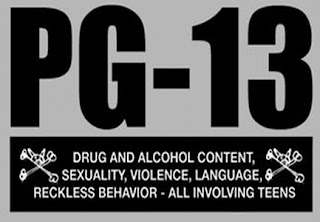
Fan Rant: PG-13 Horror Sucks and I Can Prove It
“Over the past 24 years, the PG-13 has become a sacred target for fiscally-minded filmmakers -- especially where horror movies are concerned. Now don't get me wrong: There are tons of "soft" horror movies that are perfectly entertaining, but I'm of the opinion that if you want to make something really scary, then that movie will most likely end up in the "R" territory. Graphic violence, serious tension, unpleasant themes and big-boy scares will pretty much always result in an R rating when all is said and done. Except when the goal from the very beginning is to craft a ‘PG-13 horror product’ that will sell a lot of tickets for three days even though everyone knows it's freaking terrible.”
--------------------------------------
On the Contest Circuit:
Phoenix Film Festival Announces Screenplay Challenge Results
Santa Fe Screenwriting Conference Starts May 27th
A Feeding Frenzy Announces 2008 Contest Winners
--------------------------------------
And finally…
William Goldman on Screenwriting (in 1984):
(Hat-tip to Michael Geffner.)

